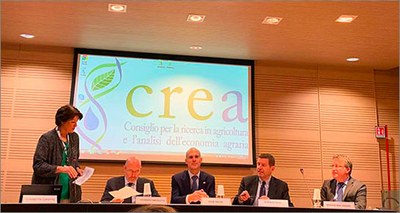Agricolture: Researchers from Italy and Israel together for sustainable farming
21/3/2019
 Early this month, a two-day workshop "Italy-Israel: working together for sustainable agrifood systems" was held in Rome, organized by CREA (Council for Agricultural Research and Economics) and ENEA, in collaboration with the Italian Ministry of Foreign Affairs and International Cooperation (MAECI) and the Israel Ministry of Science and Technology.
Early this month, a two-day workshop "Italy-Israel: working together for sustainable agrifood systems" was held in Rome, organized by CREA (Council for Agricultural Research and Economics) and ENEA, in collaboration with the Italian Ministry of Foreign Affairs and International Cooperation (MAECI) and the Israel Ministry of Science and Technology.
Based on their similar climatic conditions Italy and Israel have a long consolidated history of mutual collaboration, study, scientific cooperation and synergies, which already produced “excellent” results, said Fabrizio Nicoletti, Director General for Innovation and Research of MAECI. “We work together in over 200 projects and the collaboration between Italian and Israeli scientists is ever stronger”. In the words of Ofer Sachs, Ambassador of Israel in Italy, "Israel owns technologies that can be implemented in Italy, which paves the way to future technological collaboration facing the challenges posed by agriculture: land, water and farming”. Also, "There already exist several projects between Italy and Israel, the most interesting regarding irrigation techniques and the production of proteins from seaweeds".
On the other hand, said Federico Testa, President of ENEA, who participated in the opening session, “Agriculture is a fundamental sector and we are convinced that such collaboration not only benefits both our two countries but rather all areas of the Mediterranean. Either we work together in the Mediterranean to face the problems associated with agriculture and climate change or we are doomed to give up".
The event allowed the two countries’ institutions to compare their mutual knowledge in the field of agrifood with the aim of giving their contribution to the solution of some challenges posed by the 2030 Agenda.
Actually, sustainable agriculture can be associated with at least three SDGs involving the two countries:
1. Ecological sustainability: over-exploitation of natural resources, adverse impacts of environmental degradation by climate change (such as water scarcity, desertification, drought, land degradation, the loss of biodiversity), lack of good practices for resilience;
2. Economic sustainability: population growth, increased demand for food, poverty and unemployment (especially among young people), predominance of imported food, low profitability for smallholders, food sovereignty, lack of efficient rural sustainable development policies (particularly for women and youth), food loss and waste;
3. Social and cultural sustainability: food insecurity, migration from rural areas and from other countries, conflict areas, malnutrition (undernutrition, hidden hunger and obesity), growing public health expenditures, erosion of the Mediterranean diet heritage, food cultures and traditional, indigenous knowledge, changes in Mediterranean societies and roles of women (e.g., gender equality and inclusion), emerging new unsustainable globalized lifestyle behaviours.
On the first day, at CREA, the workshop focused on Sustainable Water Management In Semi Arid Conditions and tackling desertification, and on research infrastructures, mainly the Metrofood project. At the end of the day, Dr. Ventura, the Italian Scientific Attaché in Tel Aviv, remarked the possible opportunities for collaboration between Italy’s and Israel’s bodies and the involvement of businesses and start-ups too.
The second workshop day, held at the ENEA Casaccia Research Centre, was centered on the “Use of advanced technologies for germoplasm enhancement”: researchers from both countries could compare and integrate their knowledge, specifically, on the selection of the best wheat and potato genotypes. Eventually, the Israel’s researchers delegation visited the vertical farm and the Proteomics laboratories.
